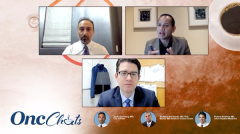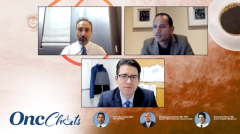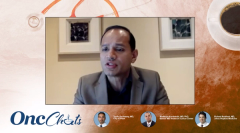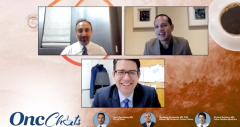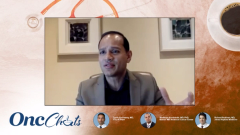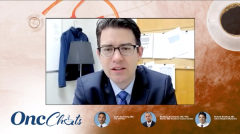
Taking Organoids From Bench to Bedside Through Endoscopy in Pancreatic Cancer: Expectations for the Future
In this fifth episode of OncChats: Taking Organoids From Bench to Bedside Through Endoscopy in Pancreatic Cancer, Toufic A. Kachaamy, MD, Madappa Kundranda, MD, PhD, and Richard Burkhart, MD, provide insight into some of the regulatory challenges of organoid development and share expectations for the future of pharmacotyping in treatment selection.
Episodes in this series

In this sixth episode of OncChats: Taking Organoids From Bench to Bedside Through Endoscopy in Pancreatic Cancer, Toufic A. Kachaamy, MD, of City of Hope, Madappa Kundranda, MD, PhD, of Banner MD Anderson Cancer Center, and Richard Burkhart, MD, of Johns Hopkins Medicine, provide insight into some of the regulatory challenges of organoid development and share expectations for the future of pharmacotyping in treatment selection.
Kundranda: At this point in time, organoids are still in the research realm. There are several labs, like you mentioned, that have been doing this for more than the past couple of decades. In terms of where we are going to be in the future, if you had a crystal ball that worked, where would you see this organoid research developing so that eventually this becomes the standard of care for our patients? [I'm asking] because as we know, where we are today with pancreatic cancer treatments is great compared with [where we were] a decade ago; [however, this is] nothing close to where any of us want to be as pancreatic scientists.
Burkhart: You’re exactly right. It’s just not good enough where our patients are right now [even though] we’ve made tremendous strides. All these things we’ve talked about in [terms of] diagnostic modalities and treatments and surgeries, [underscore the progress made]. We’re taking folks to the operating room [now; in the past] we never would have taken [them] to the operating room. [We are] getting their tumors completely [removed]. So, you’re right, we’re continuing to advance, but our patient outcomes are still not where we want them.
If I had my crystal ball and it was working, then what I would hope to see is that we’re going to overcome the limitations that are imposed [on] us from some regulatory aspects with regard to organoid development. [To clarify,] in the modern molecular diagnostics landscape, [with] things like sequencing, tumor mutation burden analysis, [and] immunohistochemistry, there’s a very clear path to getting a technology from your research laboratory into clinical utilization. This does not exist when it comes to culturing techniques. When we’re developing an organoid, and then drug testing against an organoid, there are strict limitations that are applied to that process, through the various sort of CLIA amendments and things of that nature.
As such, one of the biggest hurdles that we’re now facing, as we gain data to suggest that this is more and more feasible, and more and more helpful for our patients, is getting through that regulatory step. That’s where several of the laboratories are now. We're collaborating with some of our partner laboratories across the country to try to tackle that next step [together]. However, that’s the piece [of the puzzle] that’s missing.
[Once that is worked out], and we’re able to use these data in the service of a patient, I suspect you will very rapidly see two things happen. The first is you’ll see the randomized, prospective controlled trials that we now lack. Right now, all the data to support organoids as a predictive biomarker of chemotherapeutic response are often prospective, retrospective-association trials. I think you will start to see those randomized controlled trials come through. However, in all honesty, I think there will be a community of early adopters that utilize this technology to inform their first chemotherapeutic selection. What do I mean by that? I think it means sitting in a multi[disciplinary tumor board] and instead of flipping that coin to decide gemcitabine and nab-paclitaxel, we realize that pharmacotyping is at least as good as flipping a coin, and in my sort of crystal ball, I think it’s going to be better.
Kundranda: Excellent. We medical oncologists use a little bit more than flipping a coin. I have to at least defend my medical oncologist [colleagues] by saying that. However, you’re absolutely right. We have these discussions at our multidisciplinary clinics, right? We have this eyeball test [where we consider] gemcitabine and nab-paclitaxel vs FOLFIRINOX, and then we go back and forth. The data, to your point, even in the metastatic setting, when we’ve looked at FOLFIRINOX...it’s not like adding more is better; I think we’ve realized that. I think this would be one of those [things] that would help us make a better decision in the context of what’s the best option for the patient.
One of the simple practical challenges we run into is, say a patient gets neoadjuvant therapy and then goes in for surgery. You’re looking at the tissue under the microscope and seeing they’re not having a response. What do you give them after? Do you continue with the same thing—which is what the traditional teaching has been—or do you switch therapies? Do we have data [on that]? We don’t. We don’t have prospective data.
Check back next Thursday for the last episode in the series.


